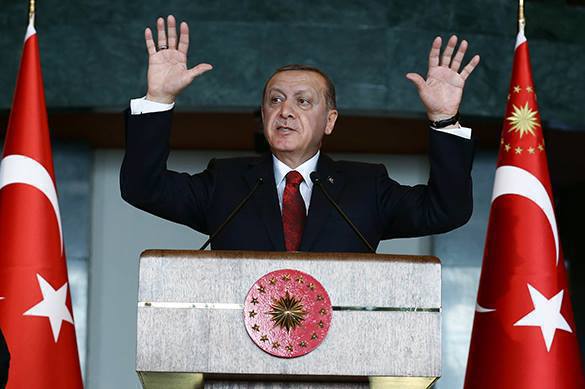Erdogan's apology to Russia: Translation error?
Kremlin spokesman Dmitry Peskov said on June 27 that Turkish President Recep Tayyip Erdogan, in a letter to Putin, "apologized" for the murder of the Russian pilot. At the same time, Turkish media outlets, particularly the state-run news agency Anadolu, were claiming that the Russians misinterpreted Erdogan's words. Is Russia lost in translation?

I'm sorry, excuse me, please forgive me, I apologize - what did Erdogan say?
According to Director of the Center of Oriental Studies, turkologist Vladimir Avatkov, Erdogan said "kusura bakmasınlar," which translates as "excuse me." "It was not quite an apology. Turkey has been trying to manipulate information in all possible ways after the shoot-down of the Russian warplane," Avatkov told the Izvestia newspaper. According to the specialist, Turkey is trying to bring back the good old days without doing anything at all.
After the announcement of the letter, Erdogan made a statement during a Ramadan meal at the presidential palace in Ankara. "I think that the letter to Putin will help improve our relations for the benefit of both countries. In the letter, I expressed my deep regret about the incident and reminded him of opportunities of the regional cooperation that we could implement. I think that we can quickly normalize the relations."
Then we heard comments from Turkish Prime Minister Binali Yildirim. "We expressed our apologies, and we say that we will pay compensation in this regard, if necessary," Al Jazeera Turkey quoted him as saying. One shall assume that the text of the published translation has been agreed with the Turkish side, and the reference to its "difficulties" was targeting internal Turkish consumers.
One can, of course, remain adamant and demand a clear apology, but it is better to wait for the next step that the Turkish government must take. It goes about a compensation and measures to bring perpetrators to justice. Finally, Turkey must stop supporting the Islamic State in Syria. If Erdogan takes the Russian "rules of the game" in Syria, the relations with Turkey may improve indeed.
Normalizing the relations is beneficial to both Russia and Turkey. Turkey would be able to bring back the tourist flow from Russia that declined by 92 percent in May compared with the previous year. Turkey would also resume the supplies of its agricultural products to Russia. In turn, Russia would have a chance to strengthen its positions in Syria and become a dominant player in the Middle East.
For Moscow, it would be much more beneficial to have stable relations with a NATO member at the time of the ongoing standoff with the North Atlantic alliance. Along with Brexit, Erdogan's statement came as a factor that dramatically reduced the risk of a hot conflict. Strategically, it appears to be beneficial to accept Erdogan's letter and take his regret for an apology, especially if he decides to return to "zero problems with neighbors" policy.
Erdogan wants to normalize relations with Israel and Egypt
On Monday, Turkey announced the signing of an agreement on the normalization of relations with Israel. Turkey also aims to improve its relations with Egypt as well. Erdogan had a conflict with Israel in 2010, after the Israelis attacked a humanitarian vessel with pro-Palestinian Turkish citizens on board. As for Egypt, Turkey was concerned about the "undemocratic" ouster of Egyptian President Mohamed Morsi.
The agreement with Israel gives Turkey access to Israeli natural gas. In turn, Egypt is an important partner in the region. In a nutshell, Turkey aims to improve relations with its neighbors, rather than with the West. The shares of Israeli and Turkish energy companies rose in prices following the news about the signed agreement. The shares of Turkish Airlines increased by 3.9 percent (TA stocks dropped by 20 percent this year). Ozdem Sanberk, former Turkish ambassador to London and Brussels, president of the Ankara-based International Strategic Research Organization, said that Turkey no longer wants to remain in isolation."
It appears that restoring previous policies is a question of survival for Turkey and the Turkish president.
Yevgeny Satanovsky, President of the Institute for the Middle East, said in an interview with Pravda.Ru that for the time being, Turkish officers continue fighting against the Syrian army. "Turkey still continues its subversive activities on the territory of Central Asia and in Russia. Erdogan's apology is very nice, but this is pretty much it," he said.
"To a certain extent, both Russia and Turkey have found themselves in isolation," Shamil Sultanov, President of the Center for Strategic Studies "Russia-the Islamic World" told Pravda.Ru. "Therefore, the desire to quickly restore the level of relations that existed between the two countries and will take some time. In fact, Erdogan's telephone conversation with Putin is supposed to finish the confidential negotiations that had been conducted on the subject since early May," the specialist added.
Lyuba Lulko
Pravda.Ru
Read article on the Russian version of Pravda.Ru
Subscribe to Pravda.Ru Telegram channel, Facebook, RSS!





